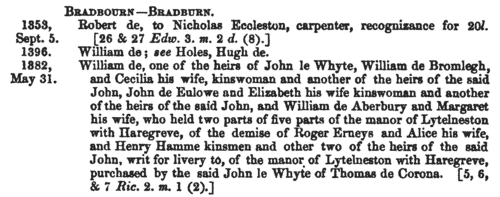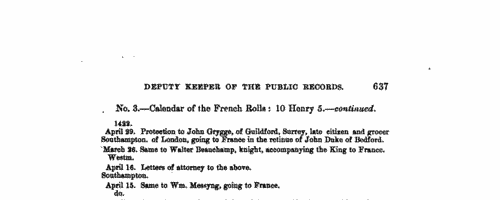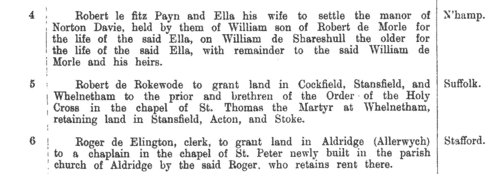Wheteley Surname Ancestry ResultsOur indexes 1000-1999 include entries for the spelling 'wheteley'. In the period you have requested, we have the following 22 records (displaying 1 to 10): Single Surname Subscription | | | Buying all 22 results of this search individually would cost £102.00. But you can have free access to all 22 records for a year, to view, to save and print, for £100. Save £2.00. More... |
These sample scans are from the original record. You will get scans of the full pages or articles where the surname you searched for has been found. Your web browser may prevent the sample windows from opening; in this case please change your browser settings to allow pop-up windows from this site. Close Rolls
(1302-1307)
The close rolls of the 31st to 35th years of the reign of king Edward I, that is to the day of his death (7 July 1307), record the main artery of government administration in England, the orders sent out day by day to individual officers, especially sheriffs of shires: they are an exceptionally rich source for so early a period. In amongst this official material, the rolls were also used as a way of recording many acknowledgments of private debts and contracts between individuals. Most of the contents relate to England, but there are also entries concerning Wales, Scotland, Ireland and the English possessions in France.WHETELEY. Cost: £4.00.  | Sample scan, click to enlarge

| Chancery Warrants
(1244-1326)
Warrants were issued by the kings of England to the royal chancery: most of these warrants led to further proceedings which are recorded on the Charter Rolls, Patent Rolls, Fine Rolls, Close Rolls or the Inquisitions: but archivists have identified a large number of warrants for which there are no such equivalent records, and those for the reigns of Edward I and Edward II are gathered here. Most of the entries relate to England and Wales, but with occasional items referring to Ireland and the English possessions in France.WHETELEY. Cost: £4.00.  | Sample scan, click to enlarge

| Close Rolls
(1333-1337)
The close rolls of the 7th to 10th years of the reign of king Edward III, that is from 25 January 1333 to 24 January 1337, record the main artery of government administration in England, the orders sent out day by day to individual officers, especially sheriffs of shires: they are an exceptionally rich source for so early a period. In amongst this official material, the rolls were also used as a way of recording many acknowledgments of private debts and contracts between individuals. Most of the contents relate to England, but there are also entries concerning Wales, Scotland, Ireland and the English possessions in France: particularly Scotland, where the king was campaigning during this period. This calendar was prepared by A. B. Hinds of the Public Record Office and published in 1898.WHETELEY. Cost: £4.00.  | Sample scan, click to enlarge

| Fine Rolls
(1369-1377)
The fine rolls of the 43rd to 51st years of the reign of king Edward III record part of the government administration in England, with orders sent out day by day to individual officers, and commitment of particular responsibilities and duties. There is also some material relating to Wales, Scotland, Ireland and the English possessions in France. WHETELEY. Cost: £4.00.  | Sample scan, click to enlarge

| Fine Rolls
(1377-1383)
The fine rolls of the 1st to 6th years of the reign of king Richard II record part of the government administration in England, with orders sent out day by day to individual officers, and commitment of particular responsibilities and duties. There is also some material relating to Wales, Scotland, Ireland and the English possessions in France. WHETELEY. Cost: £4.00.  | Sample scan, click to enlarge

| Inhabitants of Cheshire and North Wales
(1410-1413)
The county of Cheshire had palatine status, being in some measure independent of the rest of England: moreover, from the Statute of Wales of 1284, after king Edward I's subjugation of North Wales, until the union of England and Wales in 1536 to 1543, much of the administration of North Wales (county Flint in particular) was directed from Chester. When the Chester Recognizance Rolls were moved from Chester to the Public Record Office, they were placed among the Welsh Records. These rolls, so called because they do include recognizances (of debts &c.) among their contents, are in fact the Chancery Rolls of the palatinate, containing enrolments of charters, letters patent, commissions and other documents issued under the seal of the palatinate. Deeds and other evidences of a private nature were also enrolled on them. A calendar of the Recognizance Rolls from their commencement to the end of the reign of Henry IV was prepared by Peter Turner and included in the 36th Annual Report of the Deputy Keeper of the Public Records in 1875. We have now indexed this, dividing the enrolments into decades. This is the period from the 11th year of king Henry IV to the end of the reign.WHETELEY. Cost: £6.00.  | Sample scan, click to enlarge

| The English in France
(1414-1415)
King Henry V of England claimed the throne of France (and quartered the fleurs-de-lis of France with the lions of England on the royal standard) as had his predecessors since Edward III, as descendants of Philip IV of France. He married Katherine, youngest daughter of king Charles VI of France in 1420, and thereafter styled himself 'heir and regent of France'. The English had real power or influence in Brittany, Normandy, Flanders and Gascony, and actual possession of several coastal garrisons, in particular Calais, where the French inhabitants had been replaced by English. The English administration kept a series of records called the French Rolls. On these are recorded royal appointments and commissions in France; letters of protection and safe-conduct to soldiers, merchants, diplomats and pilgrims travelling to France from England and returning, and to foreign legations. There are also licences to merchants to export to the Continent, and to captains to transport pilgrims. This calendar of the French Roll for the 2nd year of the reign of Henry V (21 March 1414 to 20 March 1415) was prepared by Alexander Charles Ewald and published in 1883.WHETELEY. Cost: £6.00.  | Sample scan, click to enlarge

| Close Rolls
(1429-1435)
The close rolls of the 8th to 13th years of the reign of king Henry VI record the main artery of government administration in England, the orders sent out day by day to individual officers, especially sheriffs of shires: they are an exceptionally rich source for so early a period. There is also some material relating to Wales, Scotland, Ireland and the English possessions in France. Also included is the Exchange Roll of 1424 to 1434, of licences to transmit sums of money out of the realm.WHETELEY. Cost: £4.00.  | Sample scan, click to enlarge

| Landowners and tenants in Northumberland
(1345-1485)
Inquisitions ad quod damnum were held by the appropriate sheriff or escheator (or other officer in whose bailiwick the matter in question might lie) to investigate cases in which the royal or public interest might be damaged by proposed alienation or settlement of land (especially alienation to religious uses, into mortmain). The key findings from these inquisitions were as to the tenure of the land and the service due from it; its yearly value; the lands remaining to the grantor, and whether they sufficed to discharge all duties and customs due from him; and whether he can still be put upon juries, assizes and recognitions, so that the country be not burdened by his withdrawal from them. Generally speaking, this process had the makings of a system of licensing such alienations, and raising money in proportion to the valuations. Equally, there are many items that deal with subjects such as the closing of public roads, the felling or inclosing of woods, or the proposed grant of liberties or immunities. A calendar of these inquisitions from the 19th year of the reign of king Edward III to the 2nd year of Richard III was prepared by the Public Record Office and published in 1906. We have now indexed this calendar by surname and county. Most of the individuals appearing in the calendar are either pious individuals seeking to make grants to religious bodies for the sake of their souls; or landowners securing the disposition and settling of their real estate. But some other names do appear - tenants, trustees, chaplains and clerks.WHETELEY. Cost: £6.00.  | Sample scan, click to enlarge

| Lichfield Diocese Ordinations: Deacons Regular (1511)
The diocese of Coventry and Lichfield at this period included the whole of Cheshire, Staffordshire and Derbyshire; all Lancashire south of the Ribble; northern Shropshire (including Shrewsbury); and northern Warwickshire (including Birmingham and Coventry). Ordinations took place on the four Ember Saturdays in the year, and on certain other occasions; lists of ordinands to the degrees of acolyte, subdeacon, deacon and priest were preserved in the ordination registers, a distinction being made between those clerks who were 'regular', i.e., monks, friars, &c., and those who were 'secular', the main body of the clergy. All ordinands were celibate, and those regular, and the secular who obtained benefices, remained so, but only a minority of the secular ordinands ever obtained benefices, and most will doubtless have married later in life. No man might be ordained to subdeacon or higher without proving either that he was of independent means or that he was sponsored by an institution or a gentleman. Most entries in the register of such ordinations therefore have the words 'ad titulum' followed by the name of the religious house that was the sponsor. This is an important indication of the man's origins - boys whose families were monastic tenants, and who were educated by the monks, would naturally be sponsored by the abbey. Only men who were born and bred in the diocese could be ordained by the bishop, unless producing letters dimissory from the bishop of the diocese of their birth. These are the ordinations celebrated on Ember Saturday, 25 September 1511, by Thomas bishop of Panados (Pavados) suffragan of bishop Geoffrey Blythe, in Repton priory church.
WHETELEY. Cost: £8.00.  | Sample scan, click to enlarge

|
Research your ancestry, family history, genealogy and one-name study by direct access to original records and archives indexed by surname.
|












